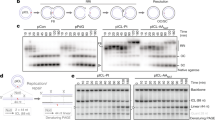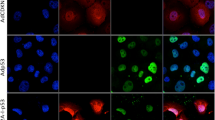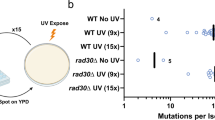Abstract
HOST-CELL reactivation of a population of physically or chemically damaged viruses is said to occur when the plaque titre of the damaged (but not the control) virus population depends strongly on the cell strain selected to serve as the host to support virus growth1,2. Such cell strain-dependent differences in survival have classically been interpreted as reflecting known cellular differences in ability to repair DNA1,2. For example, we have previously demonstrated host-cell reactivation of UV-irradiated3 or benzo(a)pyrene diol-epoxide I (anti)-treated4 human adenoviruses. The survival of such treated virus populations is much greater when their plaque titre is measured using monolayers of fibroblasts with normal DNA repair than when using fibroblasts from patients having the genetic disease, xeroderma pigmentosum, which are deficient in repair of UV-damaged DNA. The work of Lytle and coworkers5,6 and Day3, using human cells, has shown host-cell reactivation of UV-damaged viruses to occur only when nuclear replicating DNA viruses are studied. To assess the hypothesis that human tumorigenesis is often associated with repair-deficient cells, we undertook a study of host-cell reactivation of various kinds of damage using human cell strains prepared both from tumours of different organs and from skin of people having genetic predisposition to, or familial occurrence of, cancer. As part of this work, we measured the survival of adenovirus 5 treated in vitro with the carcinogen N-methyl-N′-nitro-N-nitrosoguanidine (MNNG). We found that the use of cells from 4 of 13 human brain tumour strains as viral hosts resulted in less survival of the MNNG-damaged viruses than did the use of more than 20 other cell strains prepared from human tumours or from unaffected human organs (Fig. 1, Table 1). Previous studies have not detected abnormal DNA repair in human tumours7. We believe this to be the first report of host-cell reactivation of MNNG damage by mammalian cells.
This is a preview of subscription content, access via your institution
Access options
Subscribe to this journal
Receive 51 print issues and online access
$199.00 per year
only $3.90 per issue
Buy this article
- Purchase on Springer Link
- Instant access to full article PDF
Prices may be subject to local taxes which are calculated during checkout
Similar content being viewed by others
References
Ellison, S. A., Feiner, R. R. & Hill, R. F. Virology 11, 294–296 (1959).
Rupert, C. S. & Harm, W. in Advances in Radiation Biology Vol. 2 (eds Augenstein, L. G., Mason, R. & Zelle, M.) 1–81 (Academic, New York, 1966).
Day, R. S. III Cancer Res. 34, 1965–1970 (1974).
Day, R. S., Scudiero, D. & DiMattina, M. Mutat. Res. 50, 383–394 (1978).
Aaronson, S. A. & Lytle, C. D. Nature 228, 359–361 (1970).
Lytle, C. D., Aaronson, S. A. & Harvey, E. Int. J. Rad. Biol. 22, 159–165 (1972).
Norman, A., Ottoman, R. E., Chan, P. & Klisak, I. Mutat. Res. 15, 358–360 1972.
Giard, D. J. et al. J. natn. Cancer Inst. 51, 1417–1423 (1973).
Ponten, J. in Human Tumor Cells in Vitro (ed. Fogh, J.) 175–206 (Plenum, New York, 1975).
Fogh, J., Wright, W. C. & Loveless, J. D. J. natn. Cancer Inst. 58, 209–214 (1977).
Day, R. S. III & Ziolkowski, C. in DNA Repair Mechanisms (eds Hanawalt, P. C., Friedberg, E. C. & Fox, C. F.) 535–539 (Academic, New York, 1978).
Scudiero, D. in DNA Repair Mechanisms (eds Hanawalt, P. C., Friedberg, E. C. & Fox, C. F.) 655–658 (Academic, New York, 1978).
Lynch, H. T., Mulcahy, G. M., Harris, R. E., Guirgis, H. A. & Lynch, J. F. Cancer 41, 2055–2064 (1978).
Everson, R. B., & Fraumeni, J. F. Cancer 38, 310–313 (1976).
Blattner, W. A. et al. J. Am. med. Ass. 241, 259–261 (1979).
Lawley, P. D. & Thatcher, C. J. Biochem. J. 116, 693–707 (1970).
Singer, B. Nature 264, 333–339 (1976); J. natn. Cancer Inst. (in the press).
Yamamoto, K., Kondo, S. & Sugimura, T. J. molec. Biol. 118, 413–430 (1978).
Kraemer, K. H. in DNA Repair Processes (eds Nichols, W. W. & Murphy, J. H.) 37–71 (Symposia Specialists, Miami, 1977).
Day, R. S. III Photochem. Photobiol. 19, 9–13 (1974).
Kraemer, K. H. et al. Proc. natn. Acad. Sci. U.S.A. 72, 59–63 (1975).
Author information
Authors and Affiliations
Rights and permissions
About this article
Cite this article
DAY, R., ZIOLKOWSKI, C. Human brain tumour cell strains with deficient host-cell reactivation of N-methyl-N′-nitro-N-nitrosoguanidine-damaged adenovirus 5. Nature 279, 797–799 (1979). https://doi.org/10.1038/279797a0
Received:
Accepted:
Issue Date:
DOI: https://doi.org/10.1038/279797a0
This article is cited by
-
Gene silencing in phenomena related to DNA repair
Oncogene (2002)
-
Flowcytometric and cytogenetic analysis of human cultured cell lines derived from high- and low-grade astrocytomas
Acta Neuropathologica (1983)
-
Membrane and cytoplasmic changes in 1,3-bis (2-chloroethyl)-1-nitrosourea (BCNU)-sensitive and resistant human malignant glioma-derived cell lines
Journal of Neuro-Oncology (1983)
Comments
By submitting a comment you agree to abide by our Terms and Community Guidelines. If you find something abusive or that does not comply with our terms or guidelines please flag it as inappropriate.



